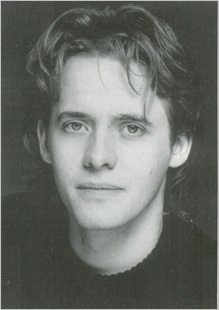
How did you meet Elliot?
We met through a mutual friend. Engineer-producer Steve McLaughlin is a friend and colleague of mine as well. We’ve worked together many times on my film scores. I think “Golden Gate” was the first film he recorded with Elliot. He’s one of a number of engineers that Elliot has worked with. We because mutual friends through Teese Gohl, who is Elliot’s producer. Elliot was in London scoring “Butcher Boy” and they didn’t have a conductor. I was on the spot; they called me and said, Would I mind coming down? It’s not really what I do; I’m not a professional conductor. I’ve had a little bit of training, but I wouldn’t put it on my passport. Because I’m a film composer and I’m comfortable with what it takes to get from A to B in terms of a recording session, they felt comfortable with me standing in front of the orchestra. As far as they were concerned, the conductor is really a conduit. Elliot will come out and actually talk to the players. The conductor’s role is as much to help translate and enunciate what Elliot is after, as opposed to the traditional role of the conductor, which is to be the sole interpreter of what’s on the page.
Didn’t you also conduct a bit of “In Dreams” as well?
This was similar to “Butcher Boy”. When Elliot’s in London and working with the London orchestras it’s sometimes not possible for him to fly over the conductors he normally works with. I’m very glad and flattered that he feels comfortable with me waving the stick on his sessions. It’s always a tremendous learning experience to hear what he does with the orchestra and the fabulous textures he can produce. “In Dreams” was done over a fairly long period, but I was the guy who came in and played reserve; that’s probably the way they used me. This is fine; it’s always a delight.
Of these two films, which do you think he scored more effectively?
If you’re talking about what an innovative film score can bring to a film, “The Butcher Boy” is a great example of a film which is brought alive in many ways through this. It’s a very visceral film score. Visceral in a very unusual way with screaming saxophones and orchestral writing which is just completely manic and on the edge for a lot of the time. That was hugely exciting; some of the string writing in that score is phenomenal.
In a completely different way “In Dreams” is fabulous and has different perspectives all going on at the same time. I remember in one of the cues we recorded Elliot had a string quartet playing music that is on the point of being ripped apart, and then there are orchestral elements which have nothing to do with what the string quartet is doing. But to comment upon that and what’s going on in the film, this is very multi-layered and intelligent writing which is almost scary to see for the first time because your brain is trying to deal with all these different elements. It’s very powerful stuff, so both of his films I worked on are equally effective.
What’s it like conducting Elliot’s scores?
It was very nerve-wracking at first because I hold him in such high esteem. It’s always very challenging when you’re working with one of your heroes, to put that to one side and just get on with the job at hand. He’s hugely supportive; as soon as you’re focusing on the music all of thoughts are put aside. It’s wonderful to work with someone who knows exactly what he wants. There isn’t a dot on the paper that isn’t considered; he knows exactly what the articulation should be, dynamically how it should be, and is prepared to go for endless takes until he gets exactly what it is. Which isn’t to say that he doesn’t want to experiment in the studio, but he starts from a point where he knows what he’s written and the way he wants it; from that point he is prepared to change until he gets the performance that he originally envisaged. He’ll strive for that every time.
What did you learn from Elliot?
There is a world beyond the film. Remember when we were talking earlier about his connection to other cultures and artistic forms. He is always someone who is ready to make connections that aren’t simply what is there on the screen. That adds depth to what he does. It’s a lesson I’m constantly trying to learn as a composer: you should always try and take a step further than what is already there. It makes a more interesting film and music experience.
Do you remember any memorable moments when working on Elliot’s scores?
The “Butcher Boy” material, just for the visceral nature of the writing, was hugely exciting. On “In Dreams” there were these crazy overdubs, these little tiny combinations of instruments that would then slot their way back into the orchestral textures. Also seeing how those orchestral textures married with the walls of guitars that he builds. “In Dreams” is also highly successful in terms of Elliot marrying electronics to the orchestra. As someone who has a background in rock ’n’ roll as well as classical, it’s really exciting to see that kind of thing being done so successfully, because it’s very difficult to do without it sounding forced.